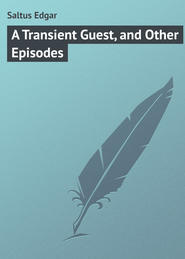По всем вопросам обращайтесь на: info@litportal.ru
(©) 2003-2024.
✖
The Monster
Настройки чтения
Размер шрифта
Высота строк
Поля
A maître d’hôtel, after presenting a carp that had been arranged as though swimming in saffron, was supervising its service.
“Padapoulos,” exclaimed the young Baronne de Fresnoy, whom the sight of the fish had, perhaps, excited, “Padapoulos told me that he dined best on an orchid soup, a mousse of aubergine, and the maxims of Confucius.”
“Padapoulos,” the legate of the Sublime Porte gravely commented, “is a poet, and a Greek. Add those two things together, and you get – you get – ”
“Nothing to eat!” the young baroness, with an explosion of little laughs, threw at him. “Musty!” she cried. “Whom were you with at the Variétés last night? I saw you. Yes, I did. Oh, Musty, who would have thought that you would be unfaithful to me!”
“These Roumis!” the Turk mentally exclaimed. “If a wife of mine talked in that way I would have her impaled.”
Beyond, across an opulent bosom, de Joyeuse and Silverstairs were talking sport. They delighted in things that men have always loved, the pursuit of prey, the joy of killing, the murderous serenity of the woods.
Farther up was Aurelia. As before, she had Buttercups on one side, Farnese on the other. She poked at the former.
“That horrid de Fresnoy woman is trying to flirt with you, Parsnips. Now, don’t deny it. I don’t blame her. You are too good-looking. When we are married – if we ever are – I’ll make you wear a veil. You sha’n’t go out except in a closed carriage. Yes, and with some big, fat, strapping woman to look after you.”
Beatifically the youth considered her. “Couldn’t you do that?”
Delicately Aurelia raised a fork. “I shall have my own affairs to attend to.” For a second she nibbled. “I have a few on my hands as it is.”
Buttercups stabbed at his plate. “I, too, may have business of my own.”
“Business! Business!” The girl repeated. “You are so commercial just like all the nobility. If you were not a peer you would be mistaken for one. It’s quite painful.”
“That may b-be,” Buttercups spluttered. “But this idea of yours of going on the stage is quite as p-painful to me.”
He hesitated, then, as though uttering a great moral truth, threw out:
“It’s so dreadful to have your name in the papers!”
“And still more dreadful not to!” the girl threw back. She turned to Farnese. “You do nothing but eat!”
With large, melancholy, inconstant eyes the Italian looked at her. “It is my one consolation since you became engaged to that imbecile.”
Aurelia pecked at her food. “One always feels quite safe with an imbecile, and that is so restful. Try it and see.”
“I’d like to try it with you.”
Aurelia put down her fork. “Am I your idea of an imbecile? You are flattering, if insincere.”
Again the Roman covered her with his eyes. “It is rather difficult to be the one and not the other. But I am perfectly sincere in saying that you are my idea of perfection.”
“Thanks, but, then, you are not mine.”
“And might one ask what yours is?”
Dreamily, with an air of innocence that was infinite, Aurelia looked at him. “You will think it childish of me, perhaps, but, like all young girls – like all young and inexperienced girls – I have an ideal. A mere maiden’s fancy, no doubt, and yet one which I cherish so. It is a vision which at times I have of a blind man, a deaf mute, a divine creature, invalid and octogenarian, who would not know what I did and would not care.”
Pausing, she dropped her eyes and sadly shook her head. “You will tell me that he don’t exist.”
“He might be manufactured,” Farnese cheerfully replied.
Then he, too, paused, drank of the wine before him, and, perhaps stimulated by it, whispered:
“Believe me, I feel as though I could cut my throat for you.”
Maliciously Aurelia looked up. “When a man does not feel that way he has no feeling at all. One might even say that he is quite heartless.”
Across the table, Tempest, turning again to Leilah, said: “Monsieur Barouffski is not here to-night.”
At the remark, instantly in her face its former expression of constraint appeared.
“No, he is to join us later.”
At the other end, where the duchess sat, everybody was laughing. The lady had been giving an account of a recent bankruptcy, that of Lord Auld Reekie.
“Heavens!” Violet Silverstairs exclaimed. “What will become of Bobbles!”
Bobbles was Lady Auld Reekie, a fair young craft of light timber and many sails.
Camille de Joyeuse, summoning her diligent smile, replied: “She will go into the hands of a receiver.”
Another jest followed, and presently, in the contagion of it almost the entire table joined.
The delicately toxic fare, the slightly emotionalising wines, loosened tongues, robbing them of discretion, and, before the servants, as though the latter were deaf and dumb, hosts and guests revealed their naked minds.
“It is rotten to talk in that way before these men,” Tempest exclaimed. “They get their wages with lessons in anarchy thrown in. It’s too much.”
“I had not heard,” Leilah replied. “I was thinking of that friend of yours whom you never met.”
Tempest laughed. “The one who said we should wish things to be as they are? Ah, well! I am afraid I am not up to that yet.”
“Nor I. But who was he, if one may ask? Not Aristotle?”
“No, but, by the way, do you know whom Aristotle is supposed to be, or rather to have become? Herbert Spencer! An occultist told me. He told me also such a curious story. You have heard, have you not, of Apollonius of Tyana? Then you may remember it is said of him that he healed the sick, raised the dead, knew all things save the caresses of women, and spoke every language including that of colours. Well, the occultist told me that Jesus was a rabbi who surrendered his entity to the Christ, and afterward reappeared here as Apollonius. He said, too, that he was not crucified. Crucifixion, you know, is merely the symbol of initiation.”
“And whom did he say was the Christ?”
“An envoy from a higher sphere.”
Leilah inclined her head. “Yes, and there have, I believe, been others. From zeniths or from nadirs unknown to us, from planes, let us say, where all beatitudes are as usual as all shames are common here, spirits commissioned to regenerate the hearts of man pass into the slums of space. Confident, with a crown of light they come, only to return with one of thorns.”
Tempest turned squarely in his chair. “That is a singularly beautiful idea!”
Again Leilah inclined her head. “It is beautiful. It is beautiful to think that earthward from some chromatic star the soul of Krishna may have sunk. But the idea is not mine. I found it in the Vidyâ.”
This last statement was lost. Mme. de Fresnoy was insisting on Tempest’s attention. Meanwhile a cygnet, its plumage replaced, a pond lily in its ochre beak, had been presented, carved and served. A salad, known as Half-Mourning, a composition of artichoke hearts and Piedmontese truffles, had departed with it. Now sweets had come, pastry light as a caress, volatile as an essence, that pastry of which the art is known only to the Oriental and the occasional cordon bleu.
Devoutly, with an air of invoking the Prophet, the Turk was absorbing it.











